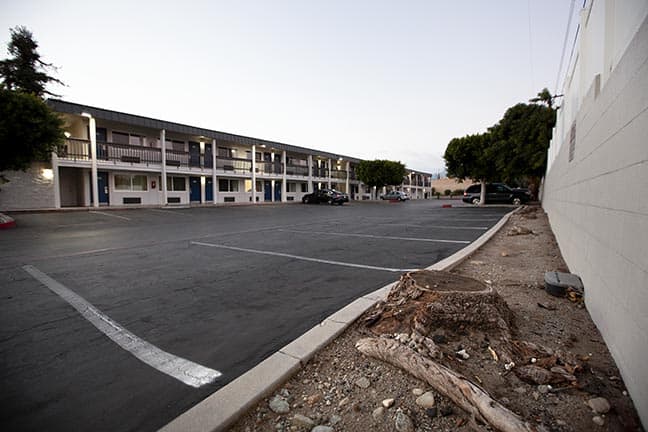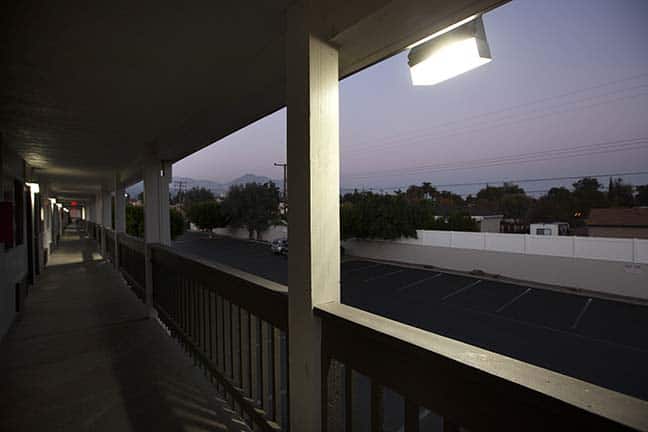Motel 6 owner appeals his own plan, council balks

The removal of a line of trees at the back of the Motel 6 property ranks among the top complaints of residents adjacent to the motel who say the light pollution coming into their yards has increased without the tree barrier. COURIER Photo/Steven Felschundneff
by Steven Felschundneff | steven@claremont-courier.com
On Tuesday, November 22, the Claremont City Council heard an appeal of a proposed landscape plan, but with a twist, because the appellant was also the party submitting the plan.
At the request of city staff, Sam Amin, the owner of Motel 6 on south Indian Hill Blvd., hired an architectural firm to develop a plan to bring the landscaping at his motel into compliance with city codes. On October 26 he submitted the firm’s design for review by the city’s architectural commission.
However, following that meeting he was not happy with several proposed changes. In response, his attorney, Anju Multani, appealed the architectural commission’s approval, asking the City Council to revert to Amin’s original plan.
Following a lengthy public hearing, the council upheld the commission’s findings and voted unanimously to deny the appeal.
City officials and local residents say the condition of the motel, including its landscaping, has been deteriorating for years. The staff report notes numerous issues at the property, including improperly pruned trees, a general lack of maintenance, and most recently a central courtyard which was not being watered, resulting in the demise of mature trees. Also, the report stated, an existing row of trees intended to provide privacy to residents of Drake Avenue just east of the motel was cut down in February by a crew working with Southern California Edison.
Soltis Landscaping’s design for Amin included replacing the motel’s neglected roughly 50-year-old landscaping with a wide variety of new plantings that would significantly beautify the property while also bringing it into compliance with the city’s new low water use requirements. According to the site plans submitted to the commission, there would be areas of decomposed granite and mulch offset by large boulders. Plantings would include Palo Verde, eastern redbud, camphor, queen palm and a host of other trees.
The architectural commission approved most of Soltis’ landscape design but it did elect to add five conditions, two of which Amin opposed: the direction to alter the exterior lighting at the motel and a requirement to increase the size of trees planted along the property’s eastern border.
Amin agreed to the other three conditions, including installing mulch along the property’s southern border on American Avenue; moving a trash enclosure away from homes on the eastern property line to a location closer to adjacent to commercial structures; and repairing and filling an empty swimming pool.
Amin, who spoke during the council meeting, disagreed with the commission’s decision to increase the box size of ficus trees to be planted adjacent to a wall on the eastern property line from 24 to 36 inches. To accommodate the larger trees, the long narrow planting area would be expanded by two feet, cutting into the parking lot at the back of the motel.
Amin told the council expanding the planting area would result in a loss of 30 parking spaces he needs for the motel’s guests. Claremont City Attorney Alisha Patterson objected to that statement, referencing a planning department map showing the parking spaces would be smaller but there would be no net loss in numbers.
The commission’s requirement to remove exterior lights mounted on the motel’s roofs and replace them with ground level lighting occupied a significant portion of the public hearing.
According to the staff report, the 1970s era plan for the property called for ground level lighting, such as light poles, and the ones installed by a previous owner at the roofline were never permitted. These lights have drawn complaints from residents on Drake that they shine into their yards, particularly now that the tree canopy is gone.
Another attorney for Amin, Frank A. Weiser, stated his client did not receive proper notice about the perceived problems with the existing lighting, and that such information was a surprise development during the architectural commission meeting.
“The issue of lighting and removing the lighting and putting up new lighting was something that was just presented to him at the time of the hearing. Therefore, that would not be a meaningful notice and opportunity for him to be able to be prepared,” Weiser said.
Patterson disagreed that Amin and his counsel had no warning the lighting would be discussed, referencing the architectural commission’s packet, which was posted 72 hours before the meeting.
According to that document, “Past ownership of the site installed roof mounted area lights throughout the metal mansard roof system on all three motel buildings. Staff was not able to identify any permits allowing this type of light fixture which creates light pollution on the entire property and has been a source of complaints over the years. Staff is requesting through a condition of approval that the property owner remove all roof mounted area lights and return to a parking lot and area lighting system that includes freestanding decorative light standards as proposed and approved in past years.”

The lights mounted to the roof became a big topic during Motel 6 Claremont owner Sam Amin’s appeal of an architectural commission approval of a landscaping plan for the motel. COURIER Photo/Steven Felschundneff
Weiser took the issue a step further, expressing his view that Amin was being denied due process, that the notification was not “meaningful” in part because the city failed to alert him and Multani personally. He contended Amin was being treated unfairly because the lighting had been in place for years and the city never brought it up as a problem with previous owners, which he said was a violation of his client’s equal protection rights.
In a brief Weiser filed with the city prior to the council meeting, he stated the actions of the architectural commission, along with recent code enforcement citations issued over unrelated issues at Motel 6, amounted to violations of Amin’s civil rights.
“As I stated at the hearing, I do not view this case as a regular code enforcement and landscaping issue,” Weiser wrote in an email to the COURIER. “The background to the appeal is that the City’s code enforcement actions, led by Brad Johnson, on orders from the Police Chief and the City Council, are over enforcing the municipal code and creating overly burdensome landscaping issues as a means to drive Mr. Amin out of business.
“As I emphasized at the hearing, doing so, raises serious constitutional problems regarding violation of the Equal Protection Clause of the Fourteenth Amendment. The Ninth Circuit has a body of case law holding the over enforcement of a city’s municipal code for pretextual purposes is a violation of equal protection of the law.”
“Nobody wants to litigate with the city of Claremont,” Weiser said during the council meeting. “If we are forced to do so we’ll go into a federal court. We’ll make this into a federal civil rights case.”
Multani repeatedly asked the council to grant Amin a continuance because, as one of his attorneys, she was not able to attend Tuesday’s hearing, which denied him representation. Weiser was in attendance and Multani participated via Zoom.
In response to a question from Mayor Jed Leano, Patterson denied the proceedings violated Amin’s rights.
“Due process requires that we provide notice and an opportunity to be heard,” Patterson said. “We provided those both at the architectural commission hearing and at the City Council hearing. It doesn’t guarantee you a right to a continuance if you would like more time or are unavailable to attend in person.”
She also rebutted the contention that the city had somehow forfeited its ability to enforce codes at the motel simply because the alleged violation had existed for some time.
“The fact that the property changed hands or that the city didn’t enforce its codes, or the prior approvals for a number of years, does not result in any type of vested right to continue with noncompliant conditions on the site,” she said. “There are ways you can get vested rights but they all rely on you having a legal or approved use in the first place. Something like the roof mounted lights, those were not permitted at the time and actually are contrary to the approvals that Motel 6 did get in the 1970s, that called for ground mounted lights.”
A separate appeal over the code violations was held on August 9, with Community Services Director Jeremy Swan serving as the hearing officer. Since then, both the appellant and the code enforcement officer have been given the opportunity to provide supplemental legal briefing. The hearing officer has not yet issued his decision.









0 Comments